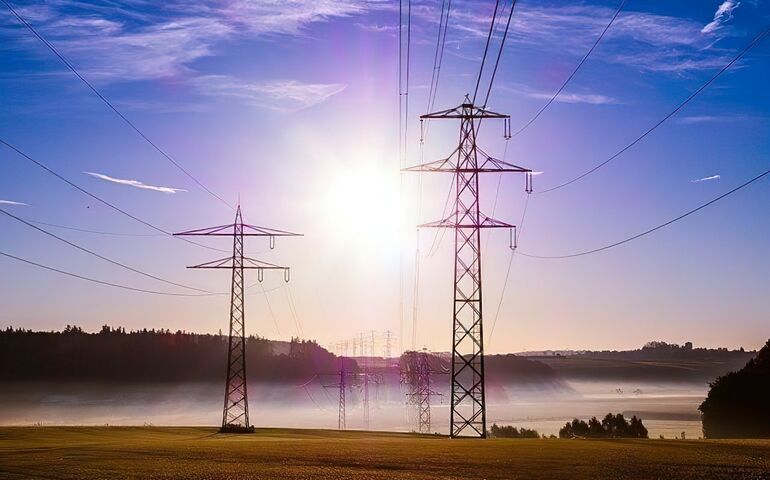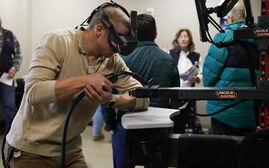
Processing Your Payment
Please do not leave this page until complete. This can take a few moments.
- News
-
Editions
View Digital Editions
Biweekly Issues
- December 1, 2025
- Nov. 17, 2025
- November 03, 2025
- October 20, 2025
- October 6, 2025
- September 22, 2025
- + More
Special Editions
- Lists
- Viewpoints
-
Our Events
Event Info
Award Honorees
- Calendar
- Biz Marketplace
With $6M grant, UMaine team will help prepare power grids for climate change
 COURTESY / MAINE PUBLIC UTILITIES COMMISSION VIA FACEBOOK
Goals for the project also include preparing the next-gen workforce for future electricity grid needs such as cybersecurity.
COURTESY / MAINE PUBLIC UTILITIES COMMISSION VIA FACEBOOK
Goals for the project also include preparing the next-gen workforce for future electricity grid needs such as cybersecurity.
A new research project led by the University of Maine will look to improve the electricity grids in communities hard hit by climate change.
The National Science Foundation has awarded a $6 million grant to support the project, called STORM: Data-Driven Approaches for Secure Electric Grids in Communities Disproportionately Impacted by Climate Change.
Over the next five years, researchers from UMaine and three other schools plan to leverage data science, create tools and grow research infrastructure that could help improve electricity grids and develop more resilient communities across the U.S.
The project was initiated in response to the impact climate change is having on local grids. For example, winter storms two years ago in Texas forced the grid to collapse and left 4.5 million homes and businesses without power. It's estimated that over 240 people died as a result of the outage.
“With climate change, everything we expected to be a one in 100-year event, are happening more often and with higher intensity,” said Reinaldo Tonkoski, UMaine Robert N. Haskell Power Professor of Electrical and Computer Engineering and STORM’s principle investigator. “How we design the grid to cope with those events is a big research question for us.”

In Maine, grid operators deal with challenges posed by geography and climate change. The state, particularly its coastal and rural communities, is at the edge of the New England’s power grid. Forests and difficult terrain make some communities especially difficult to reach when a climate emergency causes an outage.
Climate change is expected to cause more frequent severe weather events like flooding, extreme temperatures and high winds, resulting in outages that impact vulnerable communities.
In addition to Maine, researchers are working in Alaska, South Dakota and Puerto Rico — each dealing with unique challenges to their power grids.
“We are poised to have a variety of experiences to share on how to deal with different types of events,” said Tonkoski. “This will help us develop holistic and complete solutions that can be deployed both nationwide and worldwide.”
Tonkoski said the short-term goal is to foster collaboration in Maine to address major issues in reliability and cost effectiveness of the grid.
“We also will build research and workforce capabilities for the state to tackle these challenges,” he added.
Long-term goals include creating and deploying community-centered solutions that are sustainable, reliable and affordable.
Tonkoski and co-principal investigator Sharon Klein, an associate professor of economics at UMaine, will work with other researchers at the University of Alaska Fairbanks, University of Puerto Rico Mayaguez and South Dakota State University.
The team will collaborate with partners from school districts, Indigenous Nations, municipalities, electrical utilities/cooperatives, nonprofits, startup and established companies and federal laboratories.
Many of the partners are already working on community energy projects. In Galena, Alaska, a group recently finished creating a 3D map of the local system that will help assess the town’s grid.
Another project goal is to prepare undergraduate and graduate students for the workforce, at a time when much of the power engineering workforce is retiring. It’s expected that next-generation workforce skills for the future electric grid will go beyond traditional electrical engineering, to topics such as machine learning and cybersecurity.
The money comes through the U.S. Department of Energy's Established Program to Stimulate Competitive Research, or EPSCoR. Maine was one of several states awarded new EPSCoR funding this August.
“By addressing these critical challenges, and engaging with communities impacted by climate change, we have the potential to advance innovation and promote economic stability and recovery in EPSCoR jurisdictions and beyond,” said the foundation’s director, Sethuraman Panchanathan.
Mainebiz web partners
Related Content

The Giving Guide
The Giving Guide helps nonprofits have the opportunity to showcase and differentiate their organizations so that businesses better understand how they can contribute to a nonprofit’s mission and work.
Learn More
Work for ME
Work for ME is a workforce development tool to help Maine’s employers target Maine’s emerging workforce. Work for ME highlights each industry, its impact on Maine’s economy, the jobs available to entry-level workers, the training and education needed to get a career started.
Learn More
Groundbreaking Maine
Whether you’re a developer, financer, architect, or industry enthusiast, Groundbreaking Maine is crafted to be your go-to source for valuable insights in Maine’s real estate and construction community.
Learn more-
The Giving Guide
The Giving Guide helps nonprofits have the opportunity to showcase and differentiate their organizations so that businesses better understand how they can contribute to a nonprofit’s mission and work.
-
Work for ME
Work for ME is a workforce development tool to help Maine’s employers target Maine’s emerging workforce. Work for ME highlights each industry, its impact on Maine’s economy, the jobs available to entry-level workers, the training and education needed to get a career started.
-
Groundbreaking Maine
Whether you’re a developer, financer, architect, or industry enthusiast, Groundbreaking Maine is crafted to be your go-to source for valuable insights in Maine’s real estate and construction community.
ABOUT
NEW ENGLAND BUSINESS MEDIA SITES
No articles left
Get access now
In order to use this feature, we need some information from you. You can also login or register for a free account.
By clicking submit you are agreeing to our cookie usage and Privacy Policy
Already have an account? Login
Already have an account? Login
Want to create an account? Register
Get access now
In order to use this feature, we need some information from you. You can also login or register for a free account.
By clicking submit you are agreeing to our cookie usage and Privacy Policy
Already have an account? Login
Already have an account? Login
Want to create an account? Register










0 Comments